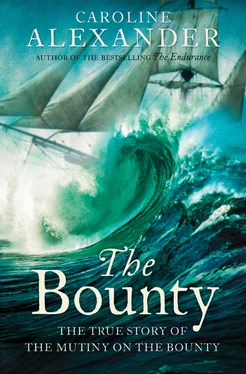Through Edward’s special pleading and contributions from his own modest Fellowship, he succeeded in scraping together an annuity of forty guineas per annum for his mother, with which, as he observed, she would ‘be able to live comfortably any where, so that if she is not secure from arrests at Moorland Close, I should have now no objections to the family’s removing to the Isle of Man.’ In the course of these negotiations with his wealthy uncle, Edward indicated the hope that ‘in time perhaps some of us may be in such circumstances as to think it a desirable object to redeem the place of our nativity.’ This touching aspiration was never to be realized. In October 1779, an advertisement was run on the front page of the Cumberland Pacquet for ‘that large commodious House situated in the Market Place of Cockermouth’ formerly belonging to John Christian, Fletcher and Edward’s oldest brother. Edward briefly became headmaster of Hawkshead Grammar School in Cumberland, where one of his pupils was Wordsworth. After seeking a position as a naval surgeon, Charles junior, the third son, entered the West Yorkshire Militia Regiment, commanded by Sir George Savile, who wrote glancingly of him, noting that ‘Mr. Christian [is] well satisfied & happy I believe in his situation. Indeed he is very deserving,’ which suggests the special attention of an aristocratic patron with ‘interest’ in his new recruit. When the regiment disbanded, Charles Christian went to Edinburgh to study medicine, and then qualified as a surgeon aboard an East India vessel called the Middlesex.
The fact that Ann Christian, with her daughter, Mary, and young Humphrey, emigrated to the Isle of Man suggests that she was not, after all, ‘secure from arrest’: debts acquired on the mainland could not be pursued here, and the island had become a haven for financially distressed gentry. Fletcher, now about fifteen, attended St Bees School, close to Whitehaven in Cumberland, but would have been a summer visitor to the island between school terms, where he encountered another part of his heritage. Here, on the Isle of Man, the Christians were an ancient and distinguished family who could trace their lineage back in an unbroken line of male successors to 1408, the year in which John MacCrysten, deemster or judge of the island, had put his signature on a deed.
It was not, however, in the magnificent, castle-like Christian family home of Milntown, with its sixteenth-century gardens and doors reputedly made from the wreckage of the Spanish Armada, that Ann and her family had settled. Bound to live within the means of her modest annuity, Ann Christian had taken her family to Douglas, where she rented property. Facing the Irish Sea and backed by miles of rolling, sparsely inhabited countryside, Douglas was more isolated and more remote than Cockermouth. It was home to just under three thousand souls. Herring sheds, a small shipyard and a brewery represented local industry. Douglas society, according to a contemporary English diarist, was ‘not of the best kind, much like that in our common Country Towns.’ But life here was cheap: no taxes, a ‘good living House at £8 a year’, and port wine for ten pence a bottle.
Between Cumberland and the Isle of Man, then, young Fletcher Christian had lived within the shadow of family greatness, even if the shadow was not cast by his own immediate kin. No evidence survives of how he passed the years between St Bees School and his sudden resurfacing in the muster roll of the Eurydice in 1783. The younger sons of Charles and Ann Christian would have been brought up to look forward to university and careers in law, following the paths of John and Edward; but the money had run out. Fletcher’s late coming to his profession, his staying ‘at school longer than young men generally do who enter into the navy’, may have been the result of family stalling, a hope that something ‘would come up’ to change their fortunes. Nevertheless, Fletcher’s proposal to Bligh – that ‘he would readily enter his ship as a Foremastman’ – indicates that the young man had accepted with great grace and optimistic courage this abrupt change of destinies.
Another of the Bounty ’s newly recruited young gentlemen had a family background remarkably similar to that of Fletcher Christian. In fact, Peter Heywood was distantly related to the Christians: his great-aunt Elizabeth had married another John Christian of Douglas, and both the Christians and his mother’s family, the Speddings, had married into the ancient Cumberland family of Curwen. On his father’s side, Peter Heywood could trace his ancestry back to Piers E’Wood in 1164, who had settled after the Norman invasion near Heywood, Lancashire. A branch of the family eventually emigrated to the Isle of Man, of whom the most famous member had been Peter ‘Powderplot’ Heywood, who had apprehended Guy Fawkes and so forestalled the plot to blow up Parliament in 1605.
Peter was born on 5 June 1772, on the Isle of Man, in his father’s house, the Nunnery, a romantic former abbey set in extensive gardens about half a mile up the hill from Douglas, and the most imposing property in the area. Peter’s father, Peter John Heywood, like many of the Manx Christians before him, was a deemster of the island, and took a scholar’s interest in the Manx language, unusual for his time.
But while Heywood may have been a learned man, he appears not to have been highly practical. The next year, he was forced by debts to sell the Nunnery, surrender his position as deemster, and move to Whitehaven, close to where Fletcher Christian was to go to school.
Exactly how the Heywoods survived over the next few years remains unclear, but in 1781, Mr Heywood was offered the appointment as seneschal, or agent, of the Duke of Atholl’s estate and holdings on the Isle of Man. Young Peter had moved back to the island with his large family of ten brothers and sisters, and settled in Douglas, where Fletcher’s mother was now also residing, and where the presence of the Nunnery must have been a constant, bitter reminder of more prosperous days.
In July 1787, only a month before Bligh received his orders for the Bounty , Peter’s father was unceremoniously dismissed by the Duke of Atholl when it was discovered that he not only had been wildly mishandling the Duke’s estate, but had also pocketed several thousand pounds of his employer’s income. Confronted with his wrongdoing, Mr Heywood had responded with self-righteous hauteur; among other tactics, he pointed out that his family could be traced as far back as the Atholls. This inability to assume any responsibility, let alone culpability, for his actions so incensed his employer that the Duke felt compelled to offer a personal rebuke. For years, he observed to Mr Heywood, ‘you have been living in a Stile of profusion far beyond your fortune, and to the detriment of your own Children spending money belonging to another.’
Mr Heywood’s sudden loss of employment had brought disaster to his family, who were forced to move out of their house, which was the Duke’s property. On the other hand, the disgrace of Mr Heywood’s offence was studiously concealed and there is no whisper of any misdeed in all the Heywood papers down through the decades after this. Apparently unashamed, the children seemed to have passed through life with all their illusions of superior gentility intact.
Peter had been sent away to school at the age of eleven, first to Nantwich school in Cheshire and then, briefly, also to St Bees, at which establishments he would have received a gentleman’s usual diet of religious instruction and Latin. His teacher at Nantwich had published books on Livy and Tacitus, and so one may hazard that young Peter had his fill of these. Unlike Fletcher, however, a seagoing career of some kind had probably been on the cards for Peter, regardless of changed family circumstances; the number of naval and military careers in the Heywood pedigree suggests this was an honoured tradition. Peter’s first naval service had been aboard the Powerful , in 1786. The Powerful , however, had never left Plymouth Harbour. As this represented his only naval experience prior to joining the Bounty , he had not yet served at sea.
Читать дальше












